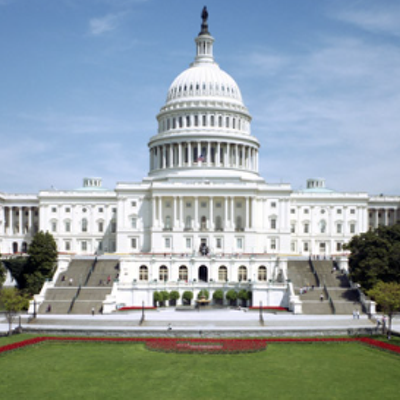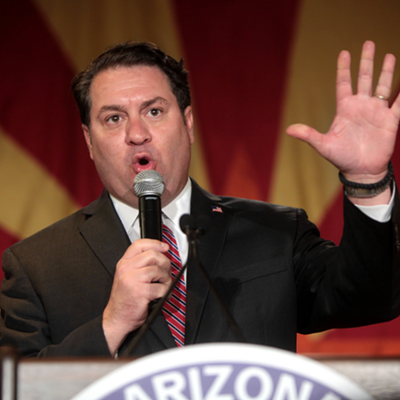SCORDATO SHAFTED
They've done a number on him, and taken away his name. Restaurateur Joseph Scordato has been slapped with a ruling by Pima County Superior Court Judge Carmine Cornelio that not only is he not allowed to use his own name on a restaurant, but he must pay $66,000 for having had the nerve to do so.That's what Evangelos Vassious was awarded in lost profits and other costs. Vassious bought the former Scordato's restaurant (near Gates Pass)--long one of Tucson's toniest--from the Scordato family in 1999, and shifted the cuisine from Continental with an Italian influence to Continental with a Greek influence. The following year, the restaurateur formerly known as Joe Scordato opened a moderately priced Italian joint on the east side called Joe Scordato's Trattoria Guiseppe.
Vassious successfully argued that he'd bought and registered the "Scordato's" trade name along with the restaurant. The man even seemed to have insinuated himself into the family by calling his place "Evangelos Scordato's."
Vassious claimed that the real Scordato sowed confusion by using his own name, costing Vassious $780,000 in lost profits. Judge Cornelio agreed, but limited the damages only to the two-year period that Scordato operated Guiseppe's, which is now in other hands.
What a relief to Vassious to know that his slow business had nothing to do with his restaurant's mediocre reviews.
As for Scordato, if he deserves to be fined, it's for not being able to spell "Joseph" in Italian. It's Giuseppe, not--as two of the three signs on the property say--Guiseppe. But just repainting the signs would've been penalty enough.
LIKINS' DOUBLE STANDARD
University of Arizona professors and other staffers are griping about a memo issued last month by prez Peter Likins outlining what they may and may not do during an election year.The memo--ambiguously headed "Thoughts for the Political Season"--reminds UA denizens that, as state employees, they're not allowed to get political during business hours. Oh sure, they can join a party and vote like (almost) anyone else, but, as the memo is worded, it's clear that if they're going to wear campaign buttons, participate in debates, circulate petitions, attend political meetings or otherwise "participate in the election process," they'd damned well better do it on their own time and make it clear that the University of Arizona does not approve their message.
Interestingly, faculty members can run for office without endangering their jobs, but employees who don't teach would have to resign if they were elected to the state Legislature.
It's not as if Likins is abrogating anybody's constitutional rights: The Arizona Constitution itself strips state employees of the right to play politics using state facilities (including e-mail accounts), and federal law prohibits universities from doing such things as publishing ratings of candidates or trying anything that smells of lobbying.
What has some profs miffed, though, is the fact that Likins had the nerve to issue this memo after having himself lobbied George Dubya Bush to speak at UA commencement--in an election year. About 150 people signed a letter in February opposing Bush's appearance, and you can bet more faculty members would be making futile noise about the memo now ... if most of them weren't off drinking mai tais all summer.
CITY LIMITS
As the city of Tucson begins its expansionist march across the valley, strong-arming developers in the Rincon Valley to agree to annexation if they want water for their new subdivisions, we're hearing a lot of bullshit about the value of swallowing up unincorporated areas.Mountain-to-mountain annexation might be a swell idea, but we're not convinced by what we're being fed by city officials and the editorial pages.
For example, we're hearing a lot about how the county is duplicating city services. What services are those, exactly? We can't think of anything outside of parks and police, and the county is still going to need to fund the sheriff's department even if the city acquires more territory. Besides, the city is going to have to pick up the bill for more cops and park workers even if annexation efforts are successful, so where are the savings?
Sure, the city would get more state-shared revenues if it had more citizens, but it would also have to expand services--including already understaffed police and fire departments--to serve those new residents. We've yet to see an honest accounting that tells us the city would at least break even by absorbing more residents.
Much of the question might be academic. The city will need to force changes to state annexation laws to make much headway in absorbing existing residents, and, in general, state lawmakers have been moving in the opposite direction, making it harder for cities and towns to expand their borders.
And county residents don't seem overly anxious to agree to annexation, especially now that the city has lost a prime incentive by instituting a garbage fee.
County residents who oppose annexation are starting to organize. Longtime Tucsonans may remember retired radio personality Phil Richardson. He's now a conscripted citizen of Oro Valley, because of an annexation effort he opposed all the way to Superior Court. What Phil discovered in the course of that lawsuit was that: (a) Oro Valley really didn't comply with all the legal requirements for annexation; and (b) it didn't matter, as the judge ruled those requirements were "substantially" met.
In other words, if any doubts are raised, the courts will lean toward favoring the government--even if they didn't follow their own rules.
Richardson has now formed STOP ANNEXATION, complete with a Web site--stopannexation.com. Part of that site is devoted to practical ways to oppose annexation from all cities and towns.
The mission statement of the site doesn't mince words: "A website for people everywhere who wish to remain free of turf wars being fought by expansionist municipalities and ambitious politicians over the right to confiscate your savings in order to serve political ambition."
Don't sell Phil short on this effort--he was one of the main sparkplugs in the '70s in the successful recall of several Tucson council members over water rates, and he led the winning fight against the incorporation of Casas Adobes.
NO GREENBACKS FOR THE GREENWAY
Over the past few months, a lot of media attention has been given to a proposed downtown greenway project. Running along the historic former route of the El Paso and Southwestern Railroad--from south of 22nd Street north to Speedway Boulevard--the 40-foot-wide path would accommodate pedestrians and bicyclists through the heart of downtown.But don't put your jogging shoes on just yet. The $500,000 needed to implement the first phase of the project between 22nd and Cushing streets is in very serious trouble.
A local panel of citizens recently ranked this project 15th out of the 20 submitted for federal grant funding. The low priority doesn't completely kill the greenway's chances for funding, but at this point, they don't look very good.
That might come as a relief to some in City Manager James Keene's office. They haven't been overly enthused about the portion of the project north of Cushing Street, as it runs near the Tucson Convention Center. Since it might conflict with their beloved Rio Nuevo dreams through this area, the lack of federal dollars for the greenway may just be OK with them.








